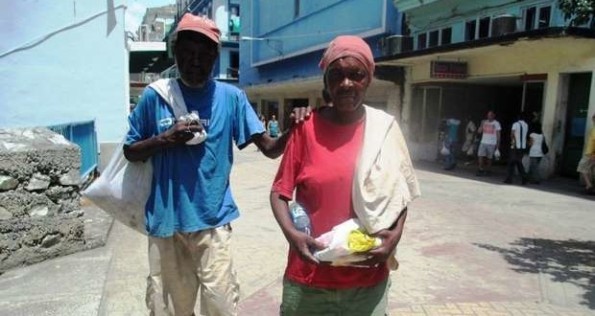 When he is lucid, Dubiel has a photographic memory. Almost thirty years after the fact, he still remembers the names of remote villages in the Angolan jungle and can tell stories about a civil war there in which more than 300,000 Cuban soldiers and reservists were involved between 1975 and 1991.
When he is lucid, Dubiel has a photographic memory. Almost thirty years after the fact, he still remembers the names of remote villages in the Angolan jungle and can tell stories about a civil war there in which more than 300,000 Cuban soldiers and reservists were involved between 1975 and 1991.
Dubiel came back traumatized. It had been very hard seeing the bodies of comrades flying through the air from land mines and dealing with the deaths fellow soldiers whom he had befriended in the trenches.
For awhile, he received psychiatric treatment and tried to adapt to civilian life. It did little to help. Alcohol and psychotropic drugs got the better of him. He became disoriented and was soon overcome by mental illness.
A human wreck, he was abandoned his family. He survives by collecting empty beer and soda cans, which are later sold as scrap. At night he sleeps wherever he can.
Smelly and hungry, he wanders the streets of La Vibora with a jute sack over his shoulders full of empty cans. When he last saw himself in a mirror, it frightened him.
“I was a good looking guy. I was headed to university and had girlfriends. The war in Angola made me crazy. If I could, I would sue the government, which I blame for my situation. There are men like me all over the country. Thrown away and forgotten. At this point I don’t care. All I want to do is die, the sooner the better,” he says while taking a swig of harsh, cheap alcohol.
Dubiel is one of 436,000 elderly men and women in Cuba — 18.3% of the population in Cuba is over the age of sixty — in need of social services. The authorities have been unable to come up with a coherent strategy for stemming the increase in begging in the country.
In the case of Havana, the regime’s response has been to round them up before big events (such as a visit by the pope or a foreign head-of-state) and take them to an internment camp south of the city, where they are bathed with high-pressure hoses and given two meals a day
After a few days they return to once again resume their lives on the street. It was not always this way. In the 1980s it was rare to see beggars and the mentally ill sleeping under covered walkways, but actions by the Castro brothers before that led to the socialization of poverty.
Social security suddenly dried up when the state lost the generous subsidies it had been receiving from the Soviet Union. By the spring of 2015 the number of beggars and destitute retirees supporting themselves by panhandling, or selling newspapers and old clothes had greatly increased.
They are the big losers from General Raul Castro’s tepid reforms. While the world’s press was praising cosmetic changes and focusing its attention on a glamorous handful of private businesses, the elderly and homeless were being forgotten.
After forty years working as an assistant bricklayer, Lazaro — a man all skin and bones — receives a pension of 193 pesos (about eight dollars) a month. After his family kicked him out of the house, he showed up one afternoon in 2014 at a dilapidated state-run nursing home, looking for shelter.
“They told me it was not an emergency, that I should go to the police and file a complaint against my family. They said that, if I tried move into a nursing home, I would have to pay 200 pesos a month starting January 2015. My pension is less than half that. If you want to move to a church-run nursing home, you have to turn over your house, and I don’t have one. For half a century everything was the property of the state, whether we liked it or not. Now with Raul Castro we are pariahs,” says Lazaro.
Near the corner of Prado and Neptune streets — where the cha-cha-cha was born — collective taxi drivers hawk their services and clueless tourists take selfies amid the ruins. Meanwhile, a bearded old man — barefoot and dirty — sleeps on a marble bench.
“He’s from a province in the east,” says a resident of Colon, as the neighborhood is known. “He often sleeps here or near the Malecon. He eats leftovers from garbage bins and barely speaks. They call him ’the Galician.’ It’s said he was in the Angolan war. I don’t think he gets anything from Social Security.”
Fleeing poverty and a bleak future in old sugar plantations and impoverished villages of the east, thousands of people move to Havana in hopes of improving their luck.
On April 22, 1997 a segregationist law, #217, went into effect which turned people from eastern Cuba into pariahs. Faced police harassment, they erected cardboard and aluminum shacks on the outskirts of the city.
They are pockets of extreme poverty, filthy slums with no sewage or electricity. “Many of the elderly and people living on the street — those who beg or get drunk — come from the eastern part of the island. Since they are here illegally, they have no rights. They are the people who have it worst,” says a social worker.
The regime has slashed spending on social assistance. The policy now is to help only those citizens whom institutions can prove are truly in need.
The problem with this approach is that thousands of elderly and needy end up not being classified by official decree. People like Dubiel, a former “dog of war” in Angola.
Photo from Juan Antonio Madrazo Luna taken from Los mendigos negros de La Habana.
